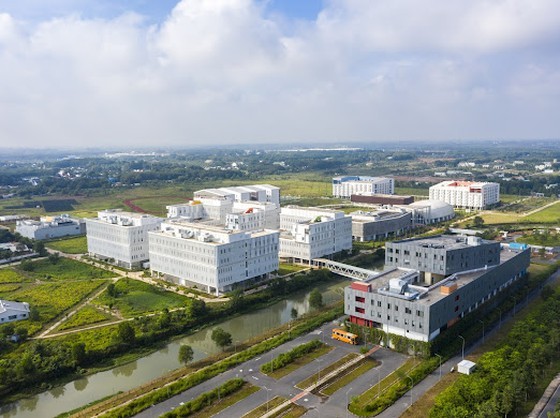 A corner of VGU
A corner of VGU
Established in 2008, the Vietnamese-German University (VGU) is a public university on the basis of the educational cooperation between Vietnam and Germany. The school applies models and academic quality standards of Germany's leading research universities; however, the curricula are adjusted to suit the demand of Vietnamese laborers in Germany and the region.
Up to now, more than 1,500 professors from universities in Germany provide lectures at the school, and the percentage of international students coming to the school to study accounts for 4.6 percent of the total number of students. Moreover, 40 percent of students enrolling at the school have their final semester at German-based universities through scholarships funded by the school in cooperation with foundations, associations and businesses.
VGU Vice President for Academic and Student Affairs Ha Thuc Vien said that the school will pilot the administrative model and academic principles of Germany’s tertiary education system towards international training and research in the Southeast Asian country. It is expected to become a good model for Vietnam’s higher education system.
The school is supported by the association of 36 leading German universities so that VGU can provide training of international quality from the first enrollment course. In all training programs, lecturers must meet the standards of prestigious universities in Germany. School graduates are awarded degrees by both VGU and a German university while lectures are given entirely in English. More specially, students are taught German.
Speaking at the inauguration ceremony, Deputy Prime Minister Vu Duc Dam congratulated VGU, a symbol of the traditional friendship and cooperation in the field of education between Vietnam and Germany. The Deputy Prime Minister also highly appreciated the cooperation between the parties, together overcoming many difficulties to have the most modern and beautiful campus in Vietnam.
He suggested that the school together with relevant ministries and agencies should focus on performing well the tasks including gathering and effectively using all resources to continue building and improving the school’s apparatus and management mechanism.
All resources should be mobilized and cooperation with partner schools should be taken heed for the continued development of advanced training programs according to German standards.
At the same time, the school should further expand cooperation with enterprises to develop training programs associated with the needs of the labor market in the 4.0 revolution, Mr. Dam said.
























